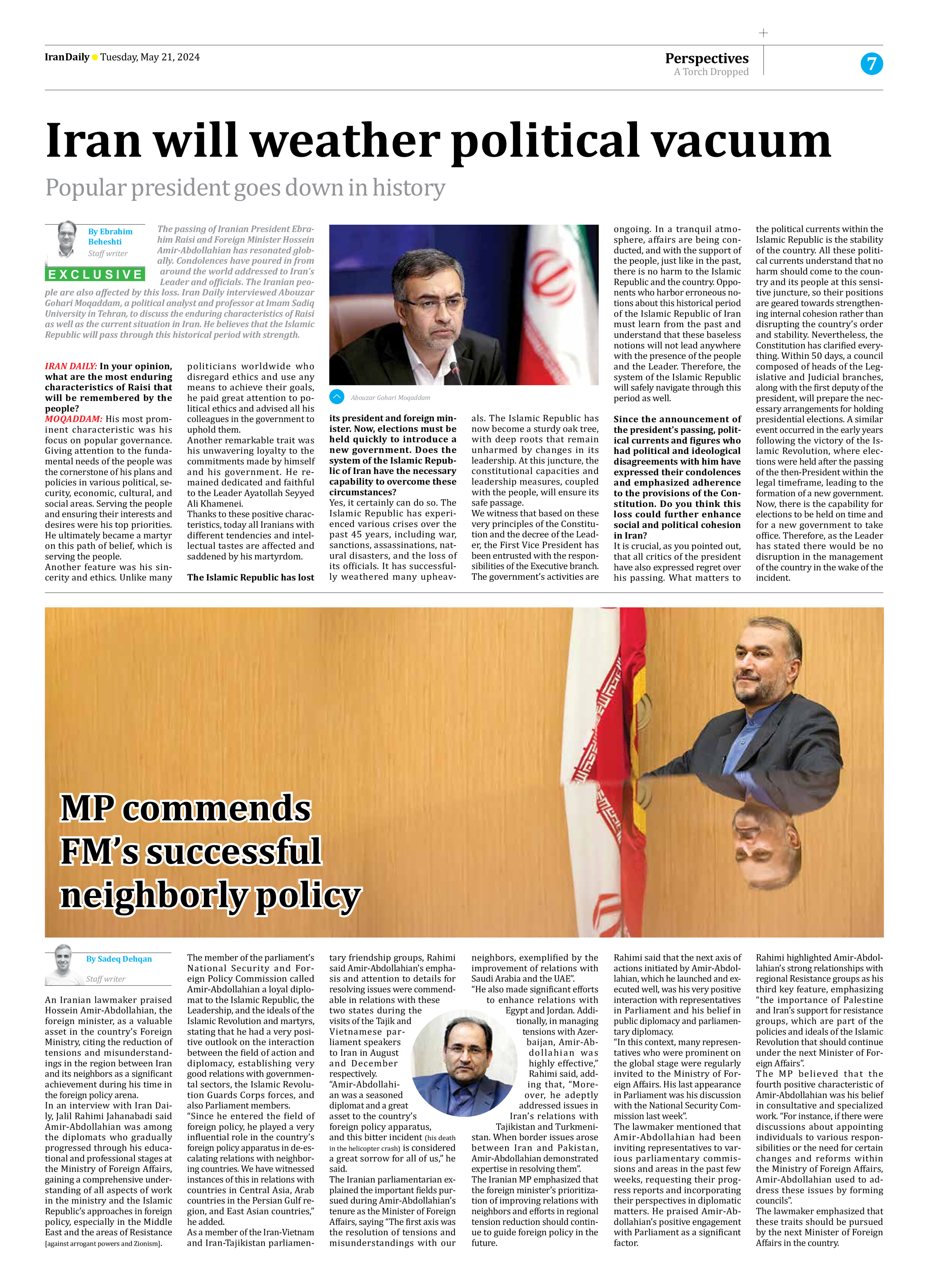
Iran will weather political vacuum
Popular president goes down in history
The passing of Iranian President Ebrahim Raisi and Foreign Minister Hossein Amir-Abdollahian has resonated globally. Condolences have poured in from around the world addressed to Iran’s Leader and officials. The Iranian people are also affected by this loss. Iran Daily interviewed Abouzar Gohari Moqaddam, a political analyst and professor at Imam Sadiq University in Tehran, to discuss the enduring characteristics of Raisi as well as the current situation in Iran. He believes that the Islamic Republic will pass through this historical period with strength.
By Ebrahim Beheshti
Staff writer
IRAN DAILY: In your opinion, what are the most enduring characteristics of Raisi that will be remembered by the people?
Moqaddam: His most prominent characteristic was his focus on popular governance. Giving attention to the fundamental needs of the people was the cornerstone of his plans and policies in various political, security, economic, cultural, and social areas. Serving the people and ensuring their interests and desires were his top priorities. He ultimately became a martyr on this path of belief, which is serving the people.
Another feature was his sincerity and ethics. Unlike many politicians worldwide who disregard ethics and use any means to achieve their goals, he paid great attention to political ethics and advised all his colleagues in the government to uphold them.
Another remarkable trait was his unwavering loyalty to the commitments made by himself and his government. He remained dedicated and faithful to the Leader Ayatollah Seyyed Ali Khamenei.
Thanks to these positive characteristics, today all Iranians with different tendencies and intellectual tastes are affected and saddened by his martyrdom.
The Islamic Republic has lost its president and foreign minister. Now, elections must be held quickly to introduce a new government. Does the system of the Islamic Republic of Iran have the necessary capability to overcome these circumstances?
Yes, it certainly can do so. The Islamic Republic has experienced various crises over the past 45 years, including war, sanctions, assassinations, natural disasters, and the loss of its officials. It has successfully weathered many upheavals. The Islamic Republic has now become a sturdy oak tree, with deep roots that remain unharmed by changes in its leadership. At this juncture, the constitutional capacities and leadership measures, coupled with the people, will ensure its safe passage.
We witness that based on these very principles of the Constitution and the decree of the Leader, the First Vice President has been entrusted with the responsibilities of the Executive branch. The government’s activities are ongoing. In a tranquil atmosphere, affairs are being conducted, and with the support of the people, just like in the past, there is no harm to the Islamic Republic and the country. Opponents who harbor erroneous notions about this historical period of the Islamic Republic of Iran must learn from the past and understand that these baseless notions will not lead anywhere with the presence of the people and the Leader. Therefore, the system of the Islamic Republic will safely navigate through this period as well.
Since the announcement of the president’s passing, political currents and figures who had political and ideological disagreements with him have expressed their condolences and emphasized adherence to the provisions of the Constitution. Do you think this loss could further enhance social and political cohesion in Iran?
It is crucial, as you pointed out, that all critics of the president have also expressed regret over his passing. What matters to the political currents within the Islamic Republic is the stability of the country. All these political currents understand that no harm should come to the country and its people at this sensitive juncture, so their positions are geared towards strengthening internal cohesion rather than disrupting the country’s order and stability. Nevertheless, the Constitution has clarified everything. Within 50 days, a council composed of heads of the Legislative and Judicial branches, along with the first deputy of the president, will prepare the necessary arrangements for holding presidential elections. A similar event occurred in the early years following the victory of the Islamic Revolution, where elections were held after the passing of the then-President within the legal timeframe, leading to the formation of a new government. Now, there is the capability for elections to be held on time and for a new government to take office. Therefore, as the Leader has stated there would be no disruption in the management of the country in the wake of the incident.







